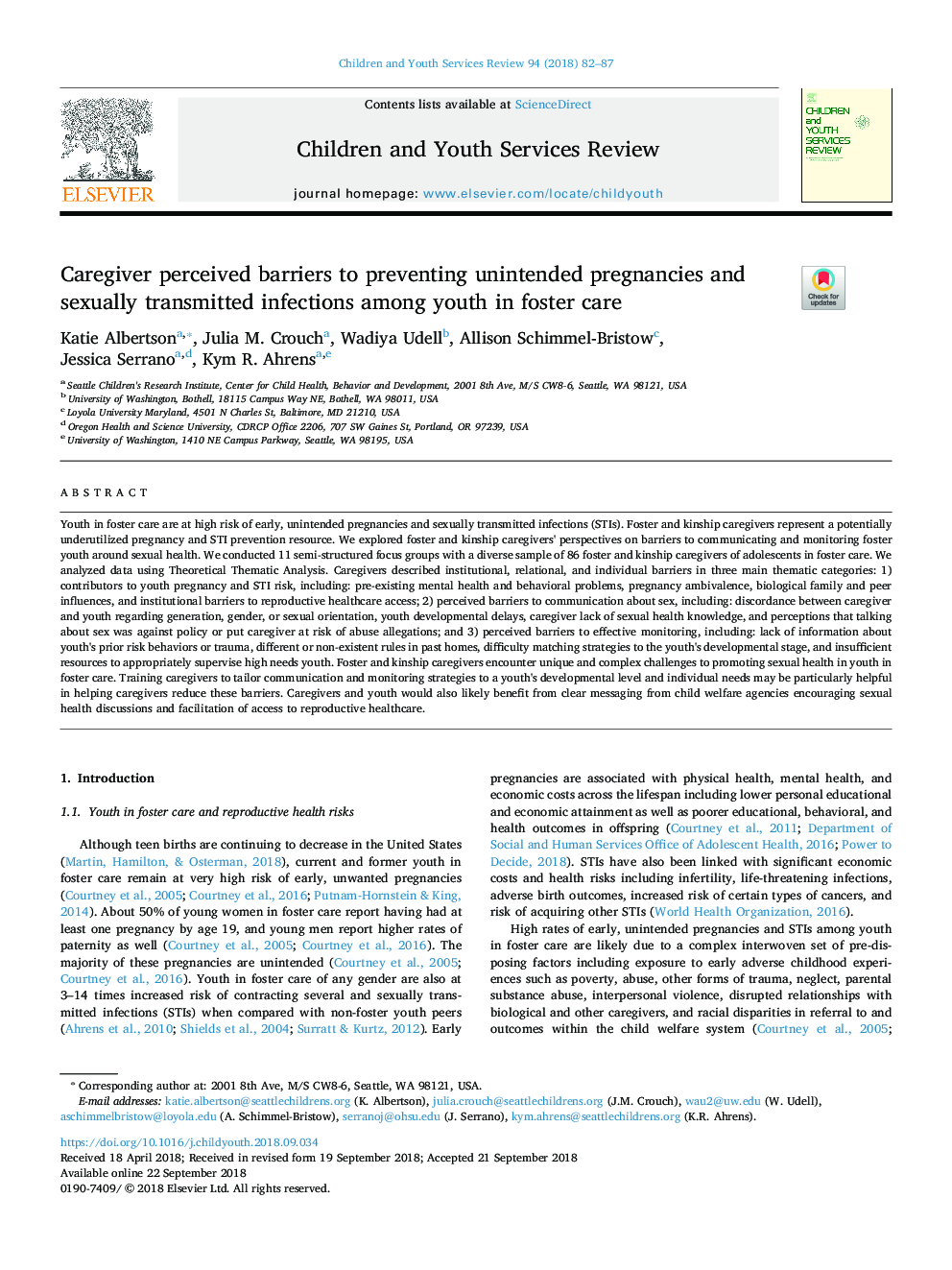| کد مقاله | کد نشریه | سال انتشار | مقاله انگلیسی | نسخه تمام متن |
|---|---|---|---|---|
| 11024047 | 1701191 | 2018 | 6 صفحه PDF | دانلود رایگان |
عنوان انگلیسی مقاله ISI
Caregiver perceived barriers to preventing unintended pregnancies and sexually transmitted infections among youth in foster care
ترجمه فارسی عنوان
مراقب موانع درک شده برای جلوگیری از حاملگی های ناخواسته و عفونت های منتقله از راه جنسی در میان جوانان در مراقبت های پرستاری
دانلود مقاله + سفارش ترجمه
دانلود مقاله ISI انگلیسی
رایگان برای ایرانیان
موضوعات مرتبط
علوم پزشکی و سلامت
پزشکی و دندانپزشکی
پریناتولوژی (پزشکی مادر و جنین)، طب اطفال و بهداشت کودک
چکیده انگلیسی
Youth in foster care are at high risk of early, unintended pregnancies and sexually transmitted infections (STIs). Foster and kinship caregivers represent a potentially underutilized pregnancy and STI prevention resource. We explored foster and kinship caregivers' perspectives on barriers to communicating and monitoring foster youth around sexual health. We conducted 11 semi-structured focus groups with a diverse sample of 86 foster and kinship caregivers of adolescents in foster care. We analyzed data using Theoretical Thematic Analysis. Caregivers described institutional, relational, and individual barriers in three main thematic categories: 1) contributors to youth pregnancy and STI risk, including: pre-existing mental health and behavioral problems, pregnancy ambivalence, biological family and peer influences, and institutional barriers to reproductive healthcare access; 2) perceived barriers to communication about sex, including: discordance between caregiver and youth regarding generation, gender, or sexual orientation, youth developmental delays, caregiver lack of sexual health knowledge, and perceptions that talking about sex was against policy or put caregiver at risk of abuse allegations; and 3) perceived barriers to effective monitoring, including: lack of information about youth's prior risk behaviors or trauma, different or non-existent rules in past homes, difficulty matching strategies to the youth's developmental stage, and insufficient resources to appropriately supervise high needs youth. Foster and kinship caregivers encounter unique and complex challenges to promoting sexual health in youth in foster care. Training caregivers to tailor communication and monitoring strategies to a youth's developmental level and individual needs may be particularly helpful in helping caregivers reduce these barriers. Caregivers and youth would also likely benefit from clear messaging from child welfare agencies encouraging sexual health discussions and facilitation of access to reproductive healthcare.
ناشر
Database: Elsevier - ScienceDirect (ساینس دایرکت)
Journal: Children and Youth Services Review - Volume 94, November 2018, Pages 82-87
Journal: Children and Youth Services Review - Volume 94, November 2018, Pages 82-87
نویسندگان
Katie Albertson, Julia M. Crouch, Wadiya Udell, Allison Schimmel-Bristow, Jessica Serrano, Kym R. Ahrens,
